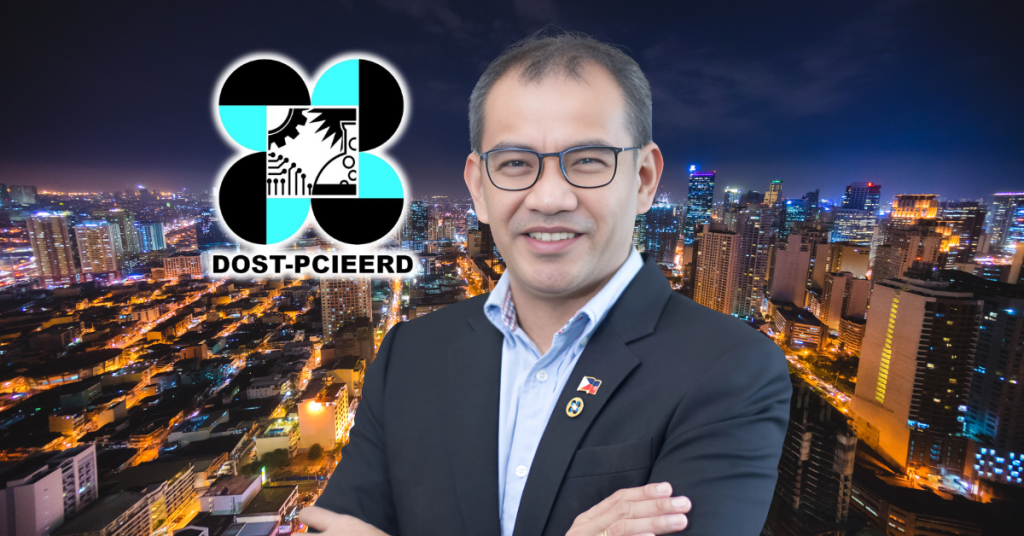While most founders build a single company, Enrico Paringit has helped build something far more ambitious—an entire ecosystem for science and innovation in the Philippines.
As the Executive Director of the Department of Science and Technology – Philippine Council for Industry, Energy and Emerging Technology Research and Development (DOST-PCIEERD), Enrico leads a public agency that’s redefining what innovation support can look like. Through strategic programs, ecosystem-building, and relentless advocacy, he’s proving that government can be a powerful enabler of entrepreneurship and deep tech innovation.
Before stepping into his role at PCIEERD, Enrico was immersed in research, engineering, and science policy. “My professional background was on teaching engineering, being a faculty of the University of the Philippines Diliman College of Engineering, and doing research and science policy,” he told Financial Adviser PH. “I was involved in research and development in space technology applications, preparing me to lead PCIEERD’s mission to build a robust innovation ecosystem in the country.”
Though his role isn’t a startup in the traditional sense, the entrepreneurial spirit is alive in everything he does. “Although this is a public service role, it carries the same drive and dedication seen in entrepreneurship,” Enrico said. “I was inspired by the opportunity to create meaningful, systemic change by enabling Filipino researchers, innovators, and startups to thrive.”
Turning Science Into Scalable Solutions
At PCIEERD, the goal is not just research for research’s sake—but turning science into scalable, impactful solutions. “One of the primary gaps was the lack of early-stage support for deep tech and science-based startups,” Enrico explained. “Many innovators had great ideas but lacked access to funding, mentorship, R&D infrastructure, or commercialization support. We stepped in to bridge that gap.”
To do that, Enrico and his team launched programs like the Startup Grant Fund, RESEED, and HEIRIT (Higher Education Institution Readiness for Innovation and Technopreneurship). These initiatives support startups from ideation to commercialization and strengthen universities as innovation hubs.
“We began by mapping out the innovation landscape and doing extensive consulting with stakeholders,” he said. “That led to strategic programs to provide R&D support and empower universities to put up and manage Technology Business Incubators (TBIs).”
Results You Can Measure
Unlike typical startups that chase profit, PCIEERD measures success through impact. “As a public agency, we don’t generate income in the traditional sense. Our budget mainly comes from the government, so we have to make wise decisions,” Enrico said. “The returns are seen in reported income, private investments, jobs created, technologies commercialized, and the resilience of our local innovation communities.”
And the results speak for themselves. “Today, the PCIEERD TBI network is composed of 59 TBIs that have incubated 1,691 startups,” Enrico shared. “These startups have generated ₱1 billion in revenues, attracted ₱1.9 billion in private investments, and created 5,576 jobs.”
Scaling the Mission
Building an ecosystem didn’t come without roadblocks. One of the biggest challenges? Changing mindsets. “Shifting traditional mindsets and breaking silos were among the early challenges,” Enrico said. “We addressed these through advocacy, pilot programs, and consistent engagement with partners to showcase tangible outcomes and build trust.”
Another key milestone was the passing of the Innovative Startup Act (RA 11337), which gave legal and financial support to the startup community. PCIEERD followed this with targeted programs like FEC SPRINT and FASTRAC, helping researchers turn scientific breakthroughs into viable ventures.
As part of his long-term vision, Enrico continues to push for greater inclusion. “If I had to start over, I would have invested earlier and more aggressively in regional innovation,” he reflected. “There is so much untapped potential across the country—we are working now to ensure no region is left behind.”
Leading Like a Startup Founder
Despite leading a government agency, Enrico’s leadership style mirrors that of a founder. “This role as ED combines public service with entrepreneurial thinking,” he said. “Unlike traditional roles, it is deeply mission-driven and offers the chance to create systemic impact across sectors.”
His typical day involves strategic planning, stakeholder meetings, mentoring startup enablers, reviewing proposals, and field visits—all part of the work to keep the ecosystem growing.
His advice for others looking to drive innovation? “Lead with empathy, listen to the needs of your ecosystem, and be ready to iterate,” he said. “Ecosystem-building is a long game—your patience and perseverance will determine your impact.”
A Future Powered by Innovation
From a research council to a national innovation engine, PCIEERD under Enrico Paringit has evolved into a critical force behind the Philippines’ startup and tech ecosystem. “PCIEERD has evolved from purely an R&D grant-giving council into a key enabler of innovation ecosystems,” he said. “Our programs now support the full life cycle of innovation—from ideation and prototyping to market entry.”
He didn’t launch a startup—but he’s helped thousands do just that. And in doing so, he’s shown that the future of the Philippine economy may very well be built on science, technology, and a well-supported innovation ecosystem.
![]()



